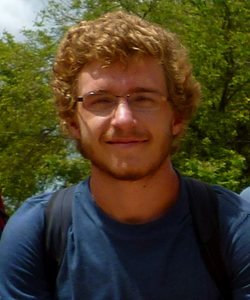Why didn’t I just flick the switch? Countless failed attempts have done away with this natural tendency. If Monday through Thursday afternoon pass without electricity, then by Friday, I have no reason to anticipate a working lamp. Defeatism prevails and I adjust to this reality. Hardly two months have passed in Dakar, and I’ve resigned myself to the inconveniences of a dysfunctional national utility company. What about a child born in this country? He and his family are left in darkness at least once a day, only it doesn’t stop there.
He sits elbow-to-elbow in class at Dakar’s Cheikh Anta Diop University, knowing full well that even a master’s degree will not guarantee gainful employment. Each evening, he walks down the highway along heaps of flaming trash whose poisonous fumes invade his lungs. On his street, shoeless Qur'anic schoolchildren accost him and beg with a shameless nonchalance. Later, he turns on the TV and sees an ossified demagogue tinkering with the constitution to secure another five years in office. Like most nights, a power outage truncates the evening news so he climbs into bed. This is what he lives, and what he lives becomes normal.
Living in Senegal means encountering these unpleasant snapshots of reality. Consider the implications for our budding citizen raised in this context. He is conditioned to digest daily injustice and government failure as facts of life: the more he sees, the more he tolerates. Upon reaching adulthood, what he expects of the state will stem solely from what it has delivered so far: not much.
A taxi ride around Dakar is enough to see the record isn’t sterling—not on education (61 percent illiteracy), not on the economy (48 percent unemployment), and not on public health (nearly 300,000 cases of malaria in 2008). In 2010, Senegal ranked 147 out of 169 on the United Nation’s Human Development Index, just above Haiti. When it comes to basic dimensions of life in the twenty-first century, the Senegalese people deserve to know that the state has fallen short. Perhaps the most staggering is that in spite of it all, earlier this year only 12 percent of eligible 18- to 22-year-olds could call themselves registered voters.
In 2011, President Abdoulaye Wade jump-started the “African Renaissance” to the tune of $27.5 million by constructing the continent’s largest statue. If we know one thing, it’s that a weak correlation exists between idolatrous monuments and sustainable development. Even 164 feet of bronze will do little to convince the unemployed entrepreneur or the middle-school dropout that they have a stake in their country’s future.
A corrosive habituation fosters complacency that dampens a thirst to change the way things are. It drains a people of their democratic sensibilities, that visceral burst of self-assertion that awakens to say, “Enough is enough!”
Until something changes, of course. That thing is “Y’en a marre!”, a broad-based hip-hop movement that emerged from civil society on January 15 of this year. Their goals? Go door-to-door and get out the vote. Their vision? To create a “Nouveau Type de Sénégalais,” one who understands free expression as the bedrock of democracy and tax dollars as an investment in the community, not government officials’ pension funds.
A country can only develop if the attitudes of its people develop. For instance, respect for marabouts and ethnic groups is a cultural hurdle to individual choice, giving well-entrenched groups undue sway over electoral outcomes. In 2007, a dumbfounded populace watched Abdoulaye Wade win another five years in the Presidential Palace.
True democratic maturity, an outspoken leader of “Y’en a marre!” told our class last week, rests on a citizenry with foresight, one that can look 20 years into the future and becomes “invested in what could be." To move forward we need to “fall in love with our country,” he told us, difficult as it may seem at the moment. That means electing leaders with the political will to do what is right for Senegal—not for France, not for the IMF, and not for their bank accounts. It means putting an end to public urination and flippant littering to cultivate a collective respect for shared space. When all is said and done, it means creating the conditions for young, talented people to stay at home where they’re most needed.
Max Weber says the state is little more than a shell of institutions that lacks inherent legitimacy. It derives its genuine authority from within, from the elements that compose it. As the subjects of this hobbling democracy, the Senegalese people alone can give meaning to its laws and leaders through an emphatic display of pride in the idea that Senegal embodies.
The expression of this idea will begin in January when “Y’en a marre!” leads a nation to the polls to elect a new president. More than just a wake-up call, the movement represents a rare opportunity to align the distant workings of government with the interests of a restive public. It represents the civic infrastructure requisite for a renewed belief in representative democracy.
Duly equipped, the people of Senegal have a chance not only to reject government as an institutionalized scandal, but to redefine politics as community and the way that community chooses to tackle the future.

